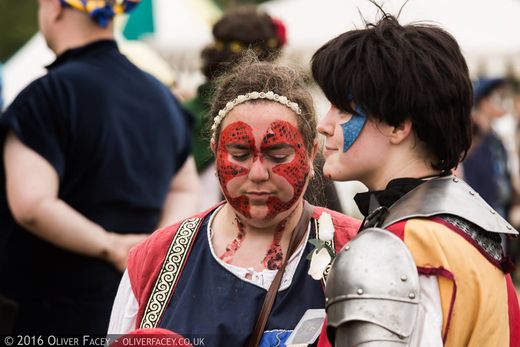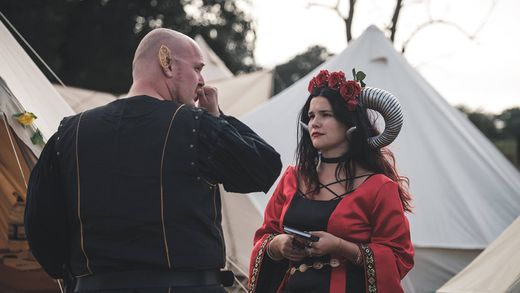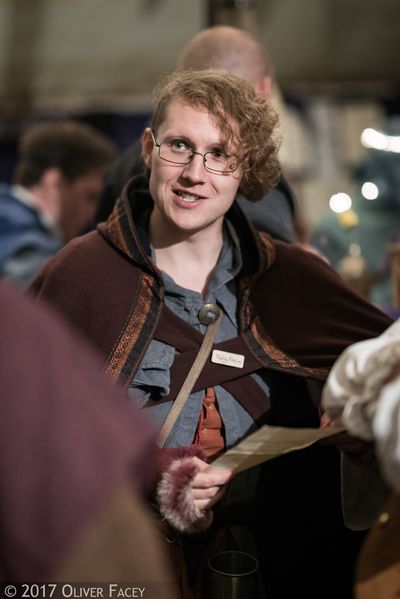Common attitudes
(Created page with "==Overview== While many elements of the setting are inspired by the medieval historical period, common attitudes to issues such as sexuality and gender are unique to the world...") |
|||
| (23 intermediate revisions by 4 users not shown) | |||
| Line 1: | Line 1: | ||
{{CaptionedImage|file=Catalina and Clarice.jpg|caption=Empire does not mimic a typical medieval fantasy world in several key areas including attitudes to [[Common attitudes#gender|gender]] and [[Common attitudes#sexuality|sexuality]].|align=left|width=520}} | |||
==Overview== | ==Overview== | ||
While many elements of the setting are inspired by the medieval historical period, common attitudes to issues such as sexuality and gender are unique to the world of Empire. These elements are not just an important part of the world, they reflect the rules for [[Conduct#Equality_and_Diversity|conduct]] in Empire. As such it is not appropriate to play a character that doesn't conform to these common attitudes, since doing so risks breaching the rules. | While many elements of the setting are inspired by the medieval historical period, common attitudes to issues such as sexuality and gender are unique to the world of Empire. These elements are not just an important part of the world, they reflect the rules for [[Conduct#Equality_and_Diversity|conduct]] in Empire. As such it is not appropriate to play a character that doesn't conform to these common attitudes, since doing so risks breaching the rules. | ||
| Line 13: | Line 14: | ||
===Polyamory=== | ===Polyamory=== | ||
In almost all parts of the world, people have no concerns of any kind with polyamory. It is regarded as a matter of personal concern, no more and no less than monoamory. Most people choose to be monogamous, but this is seen as a choice just like any other, and not one of any note or importance. The one Imperial exception to this is [[Dawn]], where long-standing cultural traditions dictate a strict insistence on monogamy. This Dawnish demand is made only of their own people, often only of their own nobles, and is widely regarded as peculiar and odd by everyone who isn't Dawnish. | In almost all parts of the world, people have no concerns of any kind with polyamory. It is regarded as a matter of personal concern, no more and no less than monoamory. Most people choose to be monogamous, but this is seen as a choice just like any other, and not one of any note or importance. The one Imperial exception to this is [[Dawn]], where long-standing cultural traditions dictate a strict insistence on monogamy. This Dawnish demand is made only of their own people, often only of their own nobles, and is widely regarded as peculiar and odd by everyone who isn't Dawnish. | ||
{{CaptionedImage|file=Equal_to_Glory.jpg|caption=Many different types of relationship are common in the Empire world.|align=right|width=520}} | |||
===Infidelity=== | ===Infidelity=== | ||
Open relationships and open marriages are unusual but not uncommon or noteworthy in most parts. Infidelity is a different matter; an individual who betrays the agreed terms of a relationship risks censure depending on the circumstances because of the dishonesty and violation of trust involved. | Open relationships and open marriages are unusual but not uncommon or noteworthy in most parts. Infidelity is a different matter; an individual who betrays the agreed terms of a relationship risks censure depending on the circumstances because of the dishonesty and violation of trust involved. | ||
These attitudes are much more pronounced in the League and Dawn. League citizens expect absolutely marital fidelity. Extramarital affairs are a serious business; they destroy the reputations of both the adulterer and their paramour (except where a cicisbeo is involved). In Dawn, people expect romantic fidelity, that people who express love for each other will remain true to that love no matter what. | These attitudes are much more pronounced in the League and Dawn. League citizens expect absolutely marital fidelity. Extramarital affairs are a serious business; they destroy the reputations of both the adulterer and their paramour (except where a cicisbeo is involved). In Dawn, people expect romantic fidelity, that people who express love for each other will remain true to that love no matter what. | ||
===Divorce=== | |||
Most Imperial citizens readily accept the existence of divorce and the need for it where a marriage has broken down. The only exception is in Dawn, where divorce is not officially recognised; the only way to break a Dawnish marriage is through dissolution of the marriage, a complicated and challenging process that involves a loss of status for any noble who attempts it. | |||
===Non-consensual Sex=== | ===Non-consensual Sex=== | ||
The concept of non-consensual sex, including sex with minors, does not exist within the world of Empire. By definition it simply does not happen; as such it is as unthinkable to everyone in the setting as trying to imagine a new colour. All players should avoid any references to non-consensual sex in play. | The concept of non-consensual sex, including sex with minors, does not exist within the world of Empire. By definition it simply does not happen; as such it is as unthinkable to everyone in the setting as trying to imagine a new colour. All players should avoid any references to non-consensual sex in play. | ||
==Gender== | ==Gender== | ||
The Empire is completely gender blind. People of any gender can occupy any societal role, and sexism simply does not exist. Women do not have to prove themselves to be warriors or men justify themselves as homemakers - these things are completely unremarkable. | The Empire is completely gender blind. People of any gender can occupy any societal role, and sexism simply does not exist. Women do not have to prove themselves to be warriors or men justify themselves as homemakers - these things are completely unremarkable. | ||
As per our guidelines on [[Conduct#Language|language]], phrases that are common in modern parlance, like "protect the women", which imply that women are helpless and need protecting literally makes no sense in Empire. People do rush to protect children in Empire but they don't try to protect the men or the women. We also ask players to be mindful of their language and try to avoid using male collective nouns when referring to mixed groups of individuals. | |||
{{CaptionedImage|file=PronounBadge.jpg|caption=Some people wear badges making their pronouns clearer while visiting Anvil|align=left|width=400}} | |||
===Gender Identity=== | ===Gender Identity=== | ||
People are assumed to belong to the gender they self-describe as and identity with, it is regarded as a personal matter of import to the individual alone. Some people in the Empire | People are assumed to belong to the gender they self-describe as and identity with, it is regarded as a personal matter of import to the individual alone. Some people in the Empire identify as non-binary or agender - a historical example is [[Empress_Mariika#Tekupala|Tekupala]], who is recorded in various sources as a man or a woman or as neither. | ||
[[Technology#Groveblossom_and_Changing_Gender|Gender transitions]] are largely considered unremarkable. Occasionally, they are accompanied by a small celebration similar to coming of age ceremony according to individual preferences and local customs. Historians might record when an individual like [[the Little Mother]], chose to transition during their lifetime, but it is not much remarked upon in history compared to such important facts as the [[glory]] of their deeds or the [[The_Way#The_Paths_of_Virtue|virtue]] they demonstrated. | [[Technology#Groveblossom_and_Changing_Gender|Gender transitions]] are largely considered unremarkable. Occasionally, they are accompanied by a small celebration similar to coming of age ceremony according to individual preferences and local customs. Historians might record when an individual like [[the Little Mother]], chose to transition during their lifetime, but it is not much remarked upon in history compared to such important facts as the [[glory]] of their deeds or the [[The_Way#The_Paths_of_Virtue|virtue]] they demonstrated. | ||
As per our rules on [[language]], you must respect other participants and try to use the pronouns they ask you to use when referring to them. | Gender badges are common in the setting. | ||
As per our rules on [[Conduct#Gender Identity|language]], you must respect other participants and try to use the pronouns they ask you to use when referring to them. | |||
==Race== | ==Race== | ||
| Line 45: | Line 48: | ||
Most people in the world of Empire judge each other on their abilities, not on their age. In the Empire, there is a widespread acceptance that children will only grow into heroes through experience of challenges and dangers. People do not needlessly endanger their children, but they do tolerate them being exposed to risks that would be unthinkable in the real world. As a result, the Empire operates a system of citizenship, where any individual old enough to pass the test is classed as an adult with all the legal privileges thereof. Those who pass the warrior test are considered old enough to take up arms and fight. | Most people in the world of Empire judge each other on their abilities, not on their age. In the Empire, there is a widespread acceptance that children will only grow into heroes through experience of challenges and dangers. People do not needlessly endanger their children, but they do tolerate them being exposed to risks that would be unthinkable in the real world. As a result, the Empire operates a system of citizenship, where any individual old enough to pass the test is classed as an adult with all the legal privileges thereof. Those who pass the warrior test are considered old enough to take up arms and fight. | ||
The one exception is in Varushka, where [[Varushka_culture_and_customs#Family|the old are accorded specific respect]] due to their perceived wisdom. Other than this there is no discrimination based on age. | |||
==Status== | ==Status== | ||
There is widespread discrimination throughout the world of Empire based on a character's socioeconomic status - however there is significant tradition of inherited wealth or titles in the Empire. The children of wealthy or powerful parents might have some advantages, but the idea of being born into an elite class is considered barbaric and uncivilised. | There is widespread discrimination throughout the world of Empire based on a character's socioeconomic status - however there is no significant tradition of inherited wealth or titles in the Empire. The children of wealthy or powerful parents might have some advantages, but the idea of being born into an elite class is considered barbaric and uncivilised. | ||
[[Category:The Empire]] | [[Category:The Empire]] | ||
[[Category:The World]] | [[Category:The World]] | ||
Latest revision as of 14:28, 29 June 2023
Overview
While many elements of the setting are inspired by the medieval historical period, common attitudes to issues such as sexuality and gender are unique to the world of Empire. These elements are not just an important part of the world, they reflect the rules for conduct in Empire. As such it is not appropriate to play a character that doesn't conform to these common attitudes, since doing so risks breaching the rules.
Where exceptions to this are possible they are identified clearly. We ask players to do their best to ensure that there is no doubt that any roleplay around these areas is directed at the character and their decisions and not the player of the character. The easiest way to do this is to check with the player in question at an appropriate point.
These attitudes have not evolved over time, there is no historical practice of people discriminating on these grounds. People in the world would find the idea of discriminating on grounds of sexuality or gender as incomprehensible as discriminating on grounds of shoe-size or favourite colour.
Sexuality
People in the world of Empire do not discriminate between individuals based on their preference for sexual partners or their attitudes to sex. Mixed gender relationships are as acceptable everywhere as same gender ones, as are asexual relationships. An individual's sexuality is of no interest to anyone but that person and their partners.
Contraception is widespread, cheap, and highly effective. Most people have no concerns about children "born out of wedlock" and none with sex outside marriage. Casual sexual relationships are completely unremarkable outside of Dawn; even there the concern is about love with sex seen as secondary to that. Slut-shaming is not acceptable in Empire under any circumstances.
Polyamory
In almost all parts of the world, people have no concerns of any kind with polyamory. It is regarded as a matter of personal concern, no more and no less than monoamory. Most people choose to be monogamous, but this is seen as a choice just like any other, and not one of any note or importance. The one Imperial exception to this is Dawn, where long-standing cultural traditions dictate a strict insistence on monogamy. This Dawnish demand is made only of their own people, often only of their own nobles, and is widely regarded as peculiar and odd by everyone who isn't Dawnish.
Infidelity
Open relationships and open marriages are unusual but not uncommon or noteworthy in most parts. Infidelity is a different matter; an individual who betrays the agreed terms of a relationship risks censure depending on the circumstances because of the dishonesty and violation of trust involved.
These attitudes are much more pronounced in the League and Dawn. League citizens expect absolutely marital fidelity. Extramarital affairs are a serious business; they destroy the reputations of both the adulterer and their paramour (except where a cicisbeo is involved). In Dawn, people expect romantic fidelity, that people who express love for each other will remain true to that love no matter what.
Divorce
Most Imperial citizens readily accept the existence of divorce and the need for it where a marriage has broken down. The only exception is in Dawn, where divorce is not officially recognised; the only way to break a Dawnish marriage is through dissolution of the marriage, a complicated and challenging process that involves a loss of status for any noble who attempts it.
Non-consensual Sex
The concept of non-consensual sex, including sex with minors, does not exist within the world of Empire. By definition it simply does not happen; as such it is as unthinkable to everyone in the setting as trying to imagine a new colour. All players should avoid any references to non-consensual sex in play.
Gender
The Empire is completely gender blind. People of any gender can occupy any societal role, and sexism simply does not exist. Women do not have to prove themselves to be warriors or men justify themselves as homemakers - these things are completely unremarkable.
As per our guidelines on language, phrases that are common in modern parlance, like "protect the women", which imply that women are helpless and need protecting literally makes no sense in Empire. People do rush to protect children in Empire but they don't try to protect the men or the women. We also ask players to be mindful of their language and try to avoid using male collective nouns when referring to mixed groups of individuals.
Gender Identity
People are assumed to belong to the gender they self-describe as and identity with, it is regarded as a personal matter of import to the individual alone. Some people in the Empire identify as non-binary or agender - a historical example is Tekupala, who is recorded in various sources as a man or a woman or as neither.
Gender transitions are largely considered unremarkable. Occasionally, they are accompanied by a small celebration similar to coming of age ceremony according to individual preferences and local customs. Historians might record when an individual like the Little Mother, chose to transition during their lifetime, but it is not much remarked upon in history compared to such important facts as the glory of their deeds or the virtue they demonstrated.
Gender badges are common in the setting.
As per our rules on language, you must respect other participants and try to use the pronouns they ask you to use when referring to them.
Race
Racism on grounds of skin colour or real world ethnicity does not exist in the world. All ethnicities of the real world are to be found in all parts of the setting, you are as likely to encounter someone with dark skin on the ice floes of Sermersuaq as you are in the Brass Coast. Make-up to change your skin colour is only appropriate if you are playing an orc or a character with lineage.
Ethnicity is only rarely of any significance or note; people who settle in the Empire and become citizens are treated the same as those who are born there. The rare exception is Varushka, where Ushkan and Vard heritage remains an important quality to some people.
Age
Most people in the world of Empire judge each other on their abilities, not on their age. In the Empire, there is a widespread acceptance that children will only grow into heroes through experience of challenges and dangers. People do not needlessly endanger their children, but they do tolerate them being exposed to risks that would be unthinkable in the real world. As a result, the Empire operates a system of citizenship, where any individual old enough to pass the test is classed as an adult with all the legal privileges thereof. Those who pass the warrior test are considered old enough to take up arms and fight.
The one exception is in Varushka, where the old are accorded specific respect due to their perceived wisdom. Other than this there is no discrimination based on age.
Status
There is widespread discrimination throughout the world of Empire based on a character's socioeconomic status - however there is no significant tradition of inherited wealth or titles in the Empire. The children of wealthy or powerful parents might have some advantages, but the idea of being born into an elite class is considered barbaric and uncivilised.


